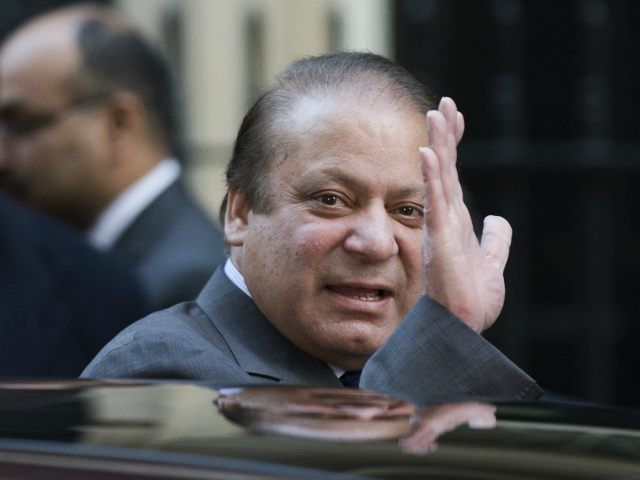Pakistan’s parliament is set to elect a new prime minister on Tuesday, replacing fallen PM Nawaz Sharif after he was ruled ineligible for public office by the country’s highest court. Opposition leaders complain the parliamentary “election” is a sham in which the ruling party will appoint a placeholder until they can install Sharif’s brother Shahbaz as the new prime minister.
As Reuters explains it, the ruling Pakistan Muslim League-Nawaz (PML-N) Party holds 188 of the 342 seats in parliament, so it can appoint just about anyone it wants. The apple of the party’s eye is Shahbaz Sharif, brother of the ousted PM and his emergency backup designated successor. The primary designated successor, Nawaz Sharif’s daughter Maryam, is caught up in the same “Panama Papers” corruption scandal that brought him down.
Unfortunately for PML-N, Shahbaz Sharif is currently a provincial minister, not a member of the national assembly, so he is not eligible to be named prime minister. He is working on rectifying that deficiency by winning a seat in about two months. Until then, the plan is to keep the Sharif throne warm by installing a solid Party man, former petroleum minister Shahid Khaqan Abbasi, as temporary prime minister.
None of this is any kind of secret plan. Nawaz Sharif openly laid out Shahbaz’s path to prime minister at a PML-N party meeting on Saturday.
“If you support anyone after me, I ask you to support Shehbaz Sharif,” he said at the meeting, not 24 hours after the Pakistani Supreme Court bounced him out of elected office. “It will take Shehbaz Sharif 50-55 days to take over as prime minister. He will have to contest elections. For the interim period, I am recommending Shahid Khaqan Abbasi for the position of prime minister.”
Abbasi, acting as if the job is already his, said on Sunday that he hopes Allah will “help me in furthering Nawaz Sharif’s policies.” He confidently predicted that he would win Tuesday’s emergency vote in a landslide.
Abbasi was also brimming with confidence that he would not be pulled into the same corruption scandal that caused Nawaz Sharif to be banned from participation in Pakistani politics.
“I’ve been a part of Parliament for 30 years and have given details of my assets 20 to 22 times. It has just become a tradition now to file all kinds of useless petitions,” he said, referring to a petition that claims he is a person of interest in several corruption investigations and should not be permitted to serve as prime minister.
Petitions are all the rage in Islamabad, as Abbasi launched one of his own against PML-N’s nemesis, Imran Khan of the Pakistan Tehreek-e-Insaf (PTI) party, seeking to disqualify him from politics for accepting foreign financial aid and hiding assets overseas – the latter being precisely the charge that brought down Prime Minister Nawaz Sharif.
Some other opposition leaders appeared to throw in the towel on Monday and accept Abbasi as the likely prime minister appointee, citing the failure of opposition groups to coalesce around a single candidate. Imran Khan does not seem to have parlayed his new cachet as a kingslayer into durable support from other opposition parties or a substantial majority of Pakistani voters; his PTI party’s candidate for prime minister, Sheikh Rasheed, could not attract enough support from other parties to become a real challenger for Abbasi, so a few other parties filed the paperwork to run their own candidates, effectively splitting the opposition vote and making Abbasi all but certain of victory.
Imran Khan held a rally in Islamabad on Sunday in which he called for “real democracy” in Pakistan and compared the Sharif family to both a hereditary monarchy and a “mafia who safeguard personal interests at any cost.”
“When we decided to move against Nawaz in the Panama case, everyone said it was a mistake because in the past, the powerful and mighty ones have been protected. But today I salute the court for giving hope to people for a new Pakistan,” Khan declared.
The UK Guardian measures the paranoia and cynicism rampant in Pakistani politics by noting that some Sharif supporters think Khan was merely a tool used by the powerful military establishment to remove Nawaz Sharif, whom they have disliked for decades, and Khan supporters who reply that he cannot be a puppet of the military because they did not install him as the new prime minister, the way they pushed Pervez Musharraf into office the last time a prime minister was deposed.
That was Nawaz Sharif on the previous occasion too. This is his third time at bat in the prime minister’s office, and his third strikeout before reaching the end of his elected term in office. His batting average is quite decent by Pakistani standards because nobody else has finished a term in the prime minister’s office in the past 70 years either. Temporary premiers holding the office for a few months until the real appointee qualifies for office don’t look so outrageous against such a historical background.

COMMENTS
Please let us know if you're having issues with commenting.